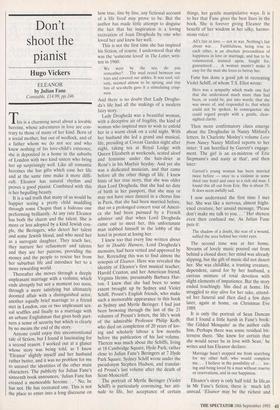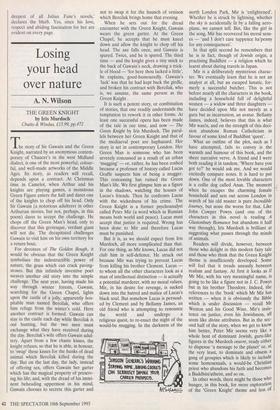Don't shoot the pianist
Hugo Vickers
ELEANOR by Julian Fane Constable, £14.99, pp.246 This is a charming novel about a lovable heroine, whose adventures in love are con- trary to those of many of her kind. Born of a social mother, but out of wedlock, and of a father whom we do not see and who knew nothing of his love-child's existence, she is deposited in a home in the suburbs of London with two kind sisters who bring her up surprisingly well. Like all romantic heroines she has gifts which ease her life and at the same time make it more diffi- cult. Eleanor has natural rhythm and proves a good pianist. Combined with this is her beguiling beauty.
It is a sad truth that many of us would be happier seeing a pretty child muddling through some Chopin than a hideous one performing brilliantly. At any rate Eleanor has both the charm and the talent. She is more or less adopted by a kind Jewish cou- ple, the Beringers, who detect her talent and some Jewish blood, and who need her as a surrogate daughter. They teach her, they nurture her refinement and talents and they are her patrons, providing the money and the people to rescue her from her suburban life and introduce her to a more rewarding world.
Thereafter she moves through a deeply unpleasant marriage with a violinist, which ends abruptly but not a moment too soon, through a more satisfying but ultimately doomed affair with a distinguished actor, another equally brief marriage to a friend met in London, one or two unpleasant sex- ual scuffles and finally to a marriage with an urbane Englishman that gives both part- ners a sense of security but which is clearly by no means The end of the story. Anyone could enjoy this unconventional tale of fiction, but I found it fascinating for a second reason. I worked out at a glance whose story was being told, as I knew `Eleanor' slightly myself and her husband rather better, and it was no problem for me to unravel the identities of the other main characters. The publicity for Julian Fane's sixteenth book announces, 'Julian Fane has created a memorable heroine. . . ' No, he has not. He has recreated one. This is not the place to enter into a long discourse on how true, line by line, any fictional account of a life lived may prove to be. But the author has made little attempt to disguise the fact that his inspiration is a loving recreation of Joan Drogheda by one who loved her and knew her well.
This is not the first time she has inspired his fiction, of course. I understood that she was the 'someone loved' in The Letter, writ- ten in 1960:
We were by the sea, do you remember?. . . The mud oozed between our toes and covered our ankles. It was cool, vel- vety, seemed almost to be sprung, and tiny bits of sea-shells gave it a stimulating crisp- ness.
And there is no doubt that Lady Droghe- da's life had all the makings of a modern fairy story.
Lady Drogheda was a beautiful woman, with a deceptive air of fragility, the kind of woman who inspired men to wish to enfold her in a warm cloak on a cold night. With her husband she led a grand and musical, life, presiding at Covent Garden night after night, taking tea at Royal Lodge with Queen Elizabeth at weekends, seated aloof and feminine under the hair-drier at Rene's in his Mayfair heyday. And yet she was a dedicated musician, and that came before all the other things of life. I knew hints of her true story, that she was older than Lord Drogheda, that she had no date of birth in her passport, that she may or may not have once danced in a chorus line in Paris, that she had been married before, that on a prolonged concert tour of Ameri- ca she had been pursued by a French admirer and that when Lord Drogheda came out to meet her, this unfortunate man stabbed himself in the lobby of the hotel in protest at losing her.
I knew too that every line written about her in Double Harness, Lord Drogheda's memoirs, had been vetted and approved by her. Rereading this was to find almost the synopsis of Eleanor. Here was revealed the identity of Eleanor's first musical teacher, Harold Craxton, and her American friend, Virginia Heims, presumably Barbara Hut- ton. I knew that she had been to some extent brought up by Sydney and Violet Schiff, Proust's English friends, who make such a memorable appearance in this book as Sydney and Myrtle Beringer. I had just been browsing through the last of the 21 volumes of Proust's letters, the life's work of the admirable Professor Philip Kolb, who died on completion of 20 years of lov- ing and scholarly labour a few months before the publication of his last volume. Therein was much about the Schiffs, living at 18 Cambridge Square, Hyde Park, rather close to Julian Fane's Beringers at 7 Hyde Park Square. Sydney Schiff wrote under the pseudonym Stephen Hudson, and translat- ed Proust's last volume after the death of Scott-Moncrieff.
The portrait of Myrtle Beringer (Violet Schiff) is particularly convincing, her atti- tude to life, her acceptance of certain things, her gentle manipulative ways. It is to her that Fane gives the best lines in the book. She is forever giving Eleanor the benefit of her wisdom in her silky, harmo- nious voice:
All's fair in love — not in war. Nothing's fair about war... Faithfulness, being true to each other, is an absolute precondition of happiness in love or marriage, and has to be volunteered, insisted upon, fought for, guaranteed. . . A woman mustn't make it easy for the man she loves to betray her.
Fane has done a good job in recreating Violet Schiff, of whom T.S. Eliot wrote:
Hers was a sympathy which made one feel that she understood much more than had been, or could be, put into words; that she was aware of, and responded to, that which could not be spoken. In consequence she could regard people with a gentle, clear- sighted clarity.
Then more confirmatory clues emerge about the Droghedas in Nancy Mitford's letters. In Charlotte Mosley's volume Love from Nancy Nancy Mitford reports to her sister: 'I am horrified by Garrett's engage- ment. The girl is an ex-mistress of Eric Siepmann's and nasty at that', and then later:
Garrett's young woman has been married twice before — once to a violinist in some third rate hotel and once to a rich old man. I found this all out from Eric. She is about 35. It does seem awfully sad.
I now understand the first time I met her. She was like a nervous, almost fright- ened creature, her unsaid message, 'Please don't make me talk to you. . . ' Her shyness even then confused me. As Julian Fane puts it:
The shadow of a doubt, the scar of a wound, sullied the area behind her violet eyes.
The second time was at her home. Streams of lovely music poured out from behind a closed door; her mind was already slipping, but the gift of music did not desert her. She was childlike, a trusting creature, dependent, cared for by her husband, a curious mixture of total devotion with slight elements of impatience. But the story ended touchingly. She died at home. He struggled to stay alive for her sake, attend- ed her funeral and then died a few days later, again at home, on Christmas Eve 1989.
It is only the portrait of Sean Duncan that I found a little harsh in Fane's book: `the Gilded Mosquito' as the author calls him. Perhaps there was some residual bit- terness there. 'She knew for certain that she would never be in love with Sean,' he writes and has Eleanor declare:
Marriage hasn't stopped me from searching for my other half, who would complete me... I believe in the possibility of ... lov- ing and being loved by a man without reserve or reservations, and in our happiness.
Eleanor's story is only half told. In life,as in Mr Fane's fiction, there is much left unread. 'Eleanor may be the richest and deepest of all Julian Fane's novels,' declares the blurb. Yes, since his love, respect and abiding fascination for her are evident on every page.



































































 Previous page
Previous page